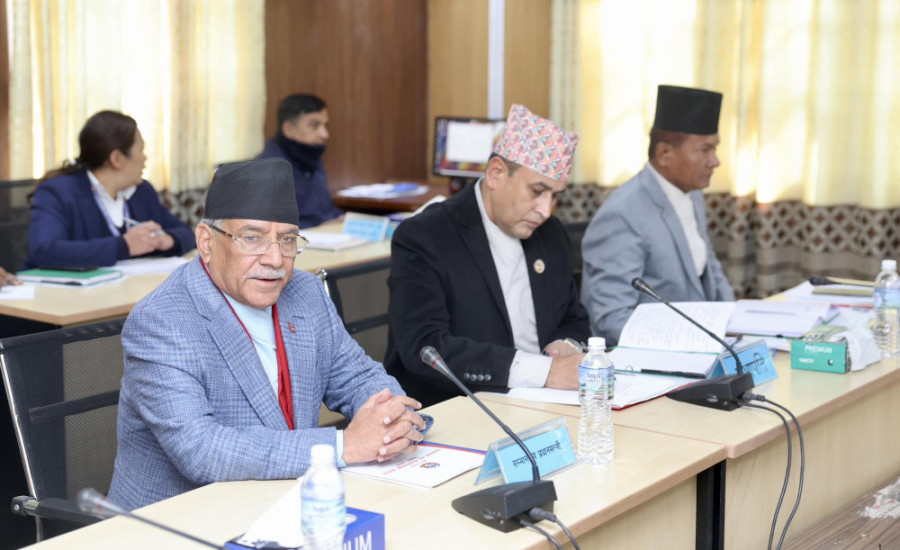National
Nationalise Ncell by 2029: House panel tells government
Prime Minister Dahal admits he, as well as other top leaders, knows Satish Lal Acharya, raising questions about political connections influencing Acharya’s share purchase deal.
Prithvi Man Shrestha
The State Affairs and Good Governance Committee of the House of Representatives on Tuesday instructed the government to take measures to bring Ncell under the government’s ownership in 2029, when the telecom service licence granted to the private company expires.
Looming risks associated with the expiry of the mobile licence in 2029 is one reason Axiata gave for its decision to exit Nepal in a statement issued on December 1. As per the Telecommunications Act 1997, the licence period of a mobile service provider is 25 years. Ncell was granted the licence in 2004, which means it expires in 2029.
As per Section 33 of the Act, a telecom company with over 50 percent foreign stake needs to hand over its assets to the government upon the expiry of the licence period. A fresh licence can be issued to the same company if it pays the value of the property that went to the government.
As per the law, a local company or one with less than 50 percent foreign ownership need not hand over its property to the government even after the expiry of the licence period. The law allows such a company to continue to provide services by taking a fresh licence.
Many suspect that the Malaysian company decided to transfer its stake in the name of a Non-resident Nepali (NRN) to avoid Ncell’s property from becoming a government asset after the expiry of the licence period.
Axiata signed a Sales and Purchase Agreement (SPA) with Spectrlite UK, registered in the United Kingdom, for the sale of Reynolds Holding Limited, which owns approximately 80 percent equity stake in the Nepal-based Ncell. Spectrlite UK is owned by Satish Lal Acharya, a person of Nepali origin currently based in Singapore.
Sunivera Capital Venture, owned by his wife, Bhavana Singh Shrestha, has another 20 percent stake in Ncell. And, there is a scope that he might transfer the ownership of Ncell to Nepali citizens as Section 10 of the Non Resident Nepali Act-2008 allows such transfer of property owned by an NRN. Experts say Acharya could use legal loopholes to save Ncell from going under government ownership in 2029.
The parliamentary State Affairs and Good Governance Committee has instructed the Prime Minister’s Office, the Ministry of Communication and Information Technology, and the Ministry of Industry, Commerce and Supply to amend laws to bring Ncell under the government’s ownership in 2029.
Many raised questions about Acharya’s close ties to top Nepali leaders, which might be a reason for his confidence to buy a stake in Ncell, a company that is supposed to go into government hands in five years.
Speaking at the State Affairs Committee, Prime Minister Dahal didn’t hide the connections between top Nepali leaders, including himself, and others in question.
“I know the person who purchased the shares of Ncell, and so do Nepali Congress President Sher Bahadur Deuba and CPN-UML Chairman KP Sharma Oli. But that does not mean he can engage in any wrongdoings in Nepal,” Prime Minister Dahal said.
He said he had stayed at Acharya’s home in Singapore when he was there during the treatment of his late wife, Sita Dahal, in the city state a few years ago.
“I know the person who purchased the shares of Ncell by registering a company in the United Kingdom overnight,” the prime minister said. “I stayed at his house [in Singapore] for two days when my wife was ill.”
Dahal said the government was committed to taking action if any wrongdoing was found in the course of the investigation for which a probe committee has been formed under the leadership of former auditor general Tanka Mani Sharma.
At the committee meeting, Dahal was also grilled for the alleged links between his family, his daughter Ganga Dahal in particular, to the sale of Ncell’s majority stake. The prime minister flatly rejected Ganga’s involvement, saying that the charge was intended to defame his family, democracy, and the republic.
Besides the prime minister, Minister for Communication and Information Technology Rekha Sharma also answered lawmakers’ questions. Following this, the State Affairs Committee came up with the decision to instruct the government on a number of issues related to the sale of Ncell’s majority stake.
The parliamentary committee instructed the government not to approve the sale of Ncell’s shares until the Sharma-led committee submits its probe report.
The committee also instructed the government to collect taxes and non-tax revenues based on the probe report if it allows the divestment of shares.
In the past, when the Swedish company Teliasonera sold 80 percent stake in Ncell to Axiata, the European company had exited Nepal without paying capital gains tax. Based on a Supreme Court order, Ncell was forced to pay the tax unpaid by the Teliasonera.
As Axiata had decided to sell all its shares to the Acharya-headed company, the State Affairs Committee ordered the government to examine whether Acharya has the experience and capability to run the telecom giant.
It also ordered the government to submit a draft bill to amend the Telecommunication Act and update it to address emerging challenges in tech governance.




 10.12°C Kathmandu
10.12°C Kathmandu















